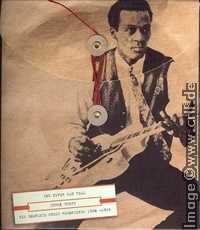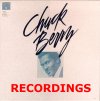A few days ago I first talked about the new Chuck Berry Box-Set from Geffen Records/Hip-O-Select. Fred then presented the box from his personal view as part of the production team. I got my copy in the meantime and here's the translation of a review I just wrote for German Rock'n'Roll Musikmagazin:
Last year we reviewed the four-CD box
Johnny B. Goode - His Complete 50's Recordings made by Geffen Records/Hip-O-Select. It contains all recordings made by Chuck Berry for the Chicago-based Chess label between 1955 and 1960. Now the manager of the Chess archives Andy McKaie and UK Chuck Berry expert and author Fred Rothwell have put another log on the fire.
You Never Can Tell is again a four-CD box, packed with everything Berry recorded for Chess between 1960 and 1966. Just like the first box it is basically complete and extensively featured. This includes a detailed booklet containing rare photos and complete session details as well as reproductions of classic album covers. Each CD looks like a Chess label from that time. Pretty!
While Berry had a lot of hits during the 1950s, the 1960s did not start to his taste. In March 1960 Berry was in court for the first time because of a story with an underage prostitute. The trials lasted until early 1962.
During this time, Chess was unable to overplay the bad press with good records. Even though the sessions in 1960 and 1961 produced some interesting material, today we know those only through the Rolling Stones:
Bye Bye Johnny,
I'm Talking About You or
Come On are just examples. In addition to such goodies many fillers were recorded which were then put on the
Rockin' At The Hops and
New Juke Box Hits albums.
Between February 1962 and October 1963 Berry sat behind bars. While in England the Beatles, the Stones and many other Beat groups recycled Berry material, there was nothing new from the master himself. The Chess brothers looked through the tapes in there archives and created from the remaining bits an album called
On Stage enhanced with fake applause. Because of this there is next to none unreleased material from that period. Just an alternate take of
Go Go Go and an instrumental version of
Brown Eyed Handsome Man can be heard for the first time in this set.
Completely unknown however was what follows next in chronological order: Immediately when released from prison, Berry entered stage again. In October 1963 four shows performed in Detroit were recorded for Chess. Because of the fake live album released just a few months before and presumably because of some sound problems these recordings remained in the vault, though. From these tapes McKaie and Rothwell collected the highlights and show us how an early 1960s Berry concert must have sounded like. Along with a very good backing band Berry runs through his greatest hits. The audience is in full swing and sings along all the lyrics even though the originals must have been oldies already even then. Unfortunately Berry's voice is hoarse and probably in Leonard Chess's view not good enough for release. Not necessarily Rock'n'Roll but interestingly from a historical view are Berry's comedy inserts where he entertains the audience telling jokes, similar to many other entertainers of that time.
Back in the studio, Berry produced hit after hit: Within four months he records the classics
Nadine,
You Never Can Tell,
The Promised Land,
No Particular Place To Go. Leonard and Phil Chess kept every note Berry played. This includes two lengthy jam sessions with Bo Diddley released on a Checker album
Two Great Guitars.
Early 1965 Berry tours England and while there he records several songs with his tour band "The Five Dimensions" including a fantastical cover version of the
St. Louis Blues. All these recordings have been published contemporary, though some only in the UK, not in the U.S. The only segment unknown was the ending of an instrumental called
O Rangutang which we all knew in shortened form only until it accidentally surfaced on a British re-issue in 1998.
To our surprise this CD set presents three songs from a completely unknown session of July 1965:
Shake Rattle & Roll,
Honey Hush and an instrumental version of
Wee Wee Hours can be heard here for the first time. The same holds for an alternate take of
His Daughter Caroline from the last session in April 1966. Because there have been no mixed tapes from these songs, Andy McKaie and Pete Doell mixed new masters from the session multi-tracks making them sound like classic Chess mixes. Well done!
In June 1966 Berry left the Chess label after having worked with them for eleven years. After some years with Mercury Records he returned to Chess in 1969. As also the Mercury tapes and the later Chess recordings are today owned by Universal, we already look forward for a third box, maybe in 2010. Until then I recommend to every Rock'n'Roll fan to use this set to learn about a lesser known side of Chuck Berry: many Blues numbers, lots of standards, but also many originals we usually know from cover versions today.
Above is my review for the magazine which is targeted to all Rock'n'Roll fans. Pure Berry collectors such as those reading this blog may want to get some more insight details:
Just like the 1950s box this new CD set is a must-have, no question. Simply a chronological collection would have been fine, but this is much more. It is beautiful and it contains true rarities. Even if you have the CD re-issues from BGO and MCA published over the last ten years, you will have only 90 percent of what's in this box. The live recordings from Detroit are interesting, though it's a pity we only get a selection of the best tracks. Maybe Andy McKaie can release an unfiltered version of the four concerts sometime in the future so we don't always have to listen to these Toronto or Roxy tracks again and again. The new 1965 session is a true surprise. Even though the songs are not necessarily highest Berry standard, you should have them. The same holds for the previously unreleased alt takes of
Go Go Go and
His Daughter Caroline as well as the previously unreleased songs
Spending Chrsitmas and
I'm In The Danger Zone. You must note, however, that this is
not the recording of same name previously known from the ARC promotional CD and subsequent bootlegs. In the ARC song Berry sings "I'm in the
twilight zone" and this is an original Chess master tape. On this new CD Berry sings "I'm in the
danger zone" and this is a new mix created from the original multi-track tapes. Even though the two songs are very similar, they are different recordings and as such should have been include here
both. Many other songs are included here multiple times if there were different mixes. Two examples for this are
Brown Eyed Handsome Man and
My Mustang Ford. Both have been known as an original 1960s mix and an 1980s stereo remix from the Rarities records. Here both come with a third mix omitting the vocal track but including another lead guitar track. This is interesting to listen to but nothing more than a warm-up probably. What really makes this set highly recommended is the Detroit concert, the 1965 session and the four unreleased takes. Get it before it's sold out!
Since I have got several questions from readers about purchasing the new 4-CD set from Europe, here's what I was able to find out: Right now you can get the box
only directly
from the label site (click here). In contrast to last year, the label will ship internationally, though only through UPS. This means that shipping to Europe will cost you another $50. And, since UPS will do all the tax processing for you, you will have to pay your local import tax (some 20%) and maybe an UPS handling fee. The box will become available in retail stores (in the U.S.) on March 31st. Then you should be able to order the set from amazon or your local record dealer.



Hi Dietmar!
Thanks for the great review. We're very proud of these Chuck Berry sets. However, I don't think putting out the entirety (or even much more) of the October '63 live performances would be the right thing.
Generally the performances are a bit rough, and Chuck's voice is considerably hoarse, which is probably why the set was shelved to begin with. Fred Rothwell and I picked out the true highlights from the shows for the box.
Best regards,
Andy McKaie
The Detroit October '63 show is something we have been waiting for till the cows come home. I like Berry's voice here, and the musicians are top notch. He plays with passion and I am sure he's rehearsed with the band, and he really had a sense of humour. Just imagine if this had been put on film!
Fred Rothwell and I have discussed this before but we didn't agree. I still mean that putting two of the same versions after each other, one in mono and then in stereo are not the best of choice("Run Around" being a good example). And I still go for the fact that if the song was originally recorded in stereo it should stay like this, and not go for any mono version even though it was first released that way.
The alternate take of "Go Go Go" is not up to standard, sound wise, which is unfortunate. Although I know the source for this, and since they (Universal) couldn't find it in their vaults, I think that maybe Berry himself could have a clean copy. But that's another impossible story.
Two tracks are a pity they couldn't locate in stereo, "Diploma For Two" and the single version of "Ramona Say Yes" (with saxophone). Especially the latter was a disapointment. The sound here is far from goode; try to listen to the original single and compare. And you still need the UK Marble Arch LP MALS-702 "You Never Can Tell" to get Diploma... in stereo. And it puzzles me. How come they recorded some tracks in stereo and some in mono at the same session? There might be some hidden treasures in the vaults somewhere.
We also still miss the UK mono variant of "Jamaica Farewell", minus a guitar.
It was goode to finally hear "Trick Or Treat" in clear sound. Not one of Berry's best, but it follows in the "Hey Pedro", "Adulteen" pattern or whatever.
And why Chess forgot about the rockin' version of "His Daughter Caroline" from April 1966 just have to be one of lifes mystery.
I've talked to Fred about it, however, the instrumental titled "Wee Wee Hours" from the forgotten 21 July 1965 session, and although it might say Wee Wee Hours on the tape, it surely is an earlier try out for "Wee Hour Blues", a track recorded later on 2 September. Listen to the bass line.
Now we can sit back, relax, dig and listen to the '50s and '60s sets and wait patiently for the next box, and although the Mercury years have been out before (except a few unissued tracks) the Berry '70s Chess recordings will be another treat as there are a lot of gems to be included. Just think of the '75 sessions (actually recorded in '74). Check out CBID Vol.2 for info on unissued recordings.
Viva, viva rock'n'roll.
Morten Reff
(Author of The Chuck Berry International Directory Vol.1-4)